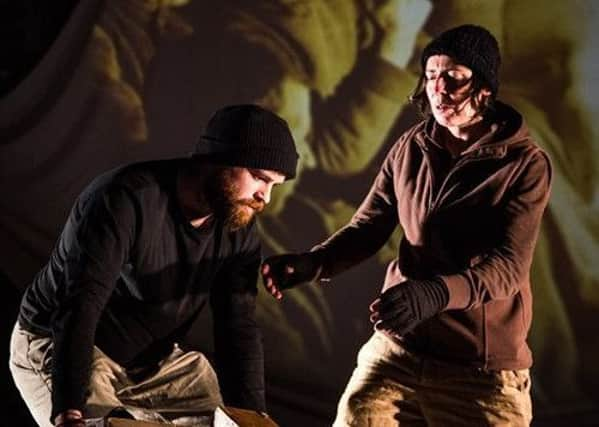Theatre reviews: The Wedding Singer | Brigadoom | Shackleton


King’s Theatre, Edinburgh
***
Oran Mor, Glasgow
***
Shackleton
****
Based on the smash-hit 1998 film that immortalised the trials and occasional triumphs of Robbie Hart – a New Jersey wedding singer whose musical career is going nowhere in the new, pushy 1980s world of deregulated Wall Street finance and brick-sized cellphones – the show frankly struggles to justify its two-and-half-hour length. From the opening scene, it’s clear Robbie and the lovely waitress Julia are destined to be together; and the effort to spin the story out leads to some pretty tiresome and tasteless interludes, including some aimless attempts to milk Ruth Madoc’s presence on stage as Robbie’s game old grandma Rosie.
Even in a lightweight musical full of soft padding, though, there’s still the odd powerful moment, in a storyline that –particularly in the great office song-and-dance sequence It’s All About The Green – gently criticises the ruthless, cash-driven and rabidly sexist culture of success that was emerging in Reagan’s America. Jon Robyns is a delightful Robbie Hart, tuneful, ironic, and lovable; Cassie Compton could hardly be more delicious as Julia. And with plenty of unsubtle but spirited supporting performances from a 20-strong company, backed by an excellent seven-piece band, The Wedding Singer delivers the kind of show that finally brings a large section of the audience to their feet, in a standing ovation for an affectionate and well-delivered tribute to their long-lost youth.
Advertisement
Hide AdThere’s more musical escapism in the second in this summer’s series of Play, Pie And Pint mini-musicals, intriguingly titled Brigadoom. Set in a rehearsal room in late-1940s New York, Tony Cox’s play imagines Alan Jay Lerner and Frederick Loewe as a young and struggling musical-making partnership, auditioning young singers for the female lead in what would become their 1947 hit show Brigadoon. The show is famously set in a fantasy Scotland of bens, glens and thatched cottages conjured up by Lerner; so when a Motherwell girl called Heather turns up to audition, proving herself captivatingly right for the role, she also has a few choice words to say about Lerner’s feeble grasp of real Scottish culture and history.
It’s a simple set-up, and the show – which seems like a scene from a larger work – lasts barely 35 minutes. Yet it features such a delightful trio of performances from the multi-talented Ali Watt as Lerner, Graham Mackay-Bruce as Loewe and Kay McAllister as Heather, that it’s impossible to resist; and if you want a pie, a drink, and a beguiling half hour out of the rain, this show will both amuse and impress.
If Brigadoon is a byword for stereotypes of Scottishness, then the name of the Antarctic explorer Ernest Shackleton often seems to stand for a very familiar kind of stiff-upper-lipped British heroism. Yet Shackleton was Anglo-Irish, born in County Kildare in 1874; and now the Blue Raincoat company from Sligo are on a brief visit to Scotland with their extraordinary evocation of Shackleton’s most famous journey, a 70-minute piece of intense visual poetry conveyed entirely through sound, music, and object theatre, involving the brilliant use of small model boats, beautifully-placed light and white sheets evoking the vast Antarctic ice-fields.
Wordless apart from a few fragments of projected text at beginning and end, Niall Henry’s exquisite production – steered by four performer-puppeteers – emerges more as a tribute to the extraordinary spirit of exploration that drove men like Shackleton, than as a profound analysis of their motives. Yet in an age when humankind may have to start exploring again, in places even more distant and unknown, this image of dogged survival against the odds strikes deep into the heart, and holds the audience absolutely rapt.